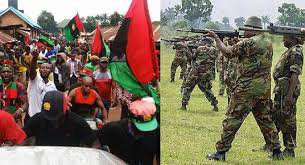On the 10th of August, 2022, there was an attack on members of the Indigenous People of Biafra (IPOB) by Nigerian security operatives in Orlu, Oguta and Owerri, Imo State, Nigeria.
The attack led to the death of some IPOB members including Chief Akubuezeugo Anthony, Chief Nkabuwa Magnus, Chief Onyehalere Donatus, and Chioma Mgbe and many people was also injured who were member of the Indigenous of Biafra (IPOB) Led by Mazi Nnamdi Kanu. The IPOB members were said to be holding a meeting when the Nigerian soldiers stormed the venue and opened fire on them without provocation, leading to several deaths and injuries.
According to the IPOB spokesperson, the security operatives were a combined team of the Nigerian Army and the Department of State Services (DSS) who stormed the venue of the meeting heavily armed with armored tanks and other military vehicles and dangerous weapons.
It will be recalled that the IPOB agitation is borne out of the marginalization of the people of the South-eastern region of Nigeria by the government led by Gen. Mohammadu Buhari (Rtd).
A villager who was interviewed by our reporter said that it is indeed obvious that the Nigeria army wants to wipe out the entire family of the late Chief Onyehalere Donatus, considering their body language.
Meanwhile, the whereabouts of other members of the slain Chiefs children remain unknown as they have all ran away for their lives since they have been tagged IPOB (indigenous people of Biafra) activists by the Nigerian Army.
I wonder when activism for freedom has become a taboo.
The spate of killings and insecurity in the Southeastern part of Nigeria is a matter of concern for the government and citizens alike. The military and other security agencies have been using excessive force in dealing with the unrest, and they have been reports of human rights abuses by the security forces.
The insecurity in the region is multifaceted, but it is largely driven by agitation for secession by some groups, including the Indigenous People of Biafra (IPOB). The group has been accused of carrying out attacks on security operatives and other civilians, while the security agencies have also been blamed for extrajudicial killings and human rights abuses.
The situation in the Southeast has led to a rise in tension and has further polarized the already fragile national unity in Nigeria. The Nigerian government needs to find a lasting solution to these issues, which include finding ways to address the underlying grievances of the groups involved, ensuring that the security forces act within the bounds of the law, and promoting dialogue and reconciliation among all stakeholders.

